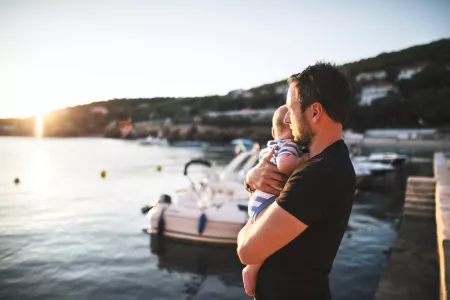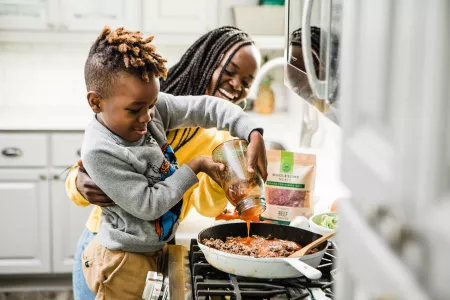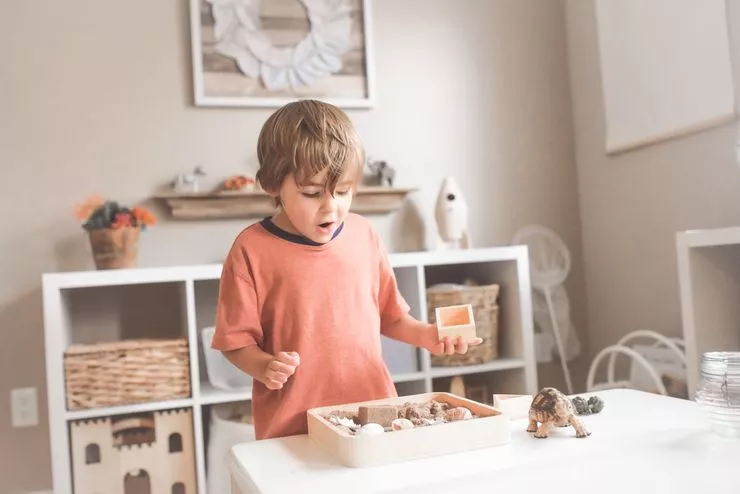How to help younger children deal with separation
My ex and I separated when our baby boy was two. In the eighteen months that have passed since the day she moved out of the family home, we have worked hard to heal and grow, both as a family and as individuals. I am happy to report that our current set-up, as co-parents who live on adjacent streets and share the responsibility and cost for our child 50/50, works well.
It wasn’t immediately easy (see my blog on co-parenting around the corner) but with every month that passes, I feel more certain and more peaceful, about the choice we made to separate. For our son, however, the trajectory hasn’t been so linear. Initially, he seemed to slide freely into the transition of having two homes instead of one, simply excited to have a dinosaur duvet and a whole new set of toys. But then aged three, he began sometimes to wake in tears, crying for the other parent, though was easily soothed with cuddles and hot milk. It is only now, a very articulate and chatty four-year-old, that he is starting to show his obvious disappointment, upon being collected from nursery by me and not his other mama and his sadness, by saying, ‘I want both my mummies together’ whilst spending yet another day at the park with just one of his parents.
"I want both my mummies together"...
It is more than difficult to witness this beautiful little boy’s grief as he comes to realise how powerless he is over our separation and the obvious impact on him. But witness and acknowledge it we must, because to do anything other than directly connect with his pain, in a child-appropriate way, would be to merely increase it with dismissal.
Certainly, I have to fight my own urge to distract him too immediately from his feelings; the guilt that makes me want to loosen all-important parental boundaries; my desire to make him instantaneously happy; my will to remove or cover up his pain (and thus to also skip over mine). Thankfully though, I know, from years of having my feelings witnessed and acknowledged in therapy and having trained as a therapist too, that to skip over the difficult emotions helps no one.
"To skip over the difficult emotions helps no one"...
My son’s sadness needs honouring, not pushing down. First, I must acknowledge what I think he might be feeling, leaving him some space to direct me if I’m a little bit off (“Are you sad, or angry, do you think? Show me with your face what you are feeling”), so that together we can help him to find a language for his experience. I might say: “You wanted the other mummy, didn’t you?” (He nods. Cries a bit.) “Maybe you’re missing her a lot.” (He nods.) “Show me with your face what you are feeling?” (He screws up his face and looks down.) “That seems like sad and angry huh?” (Maybe he doesn’t reply. Perhaps he cries. Nods.) So I say: “It feels sad and hard sometimes that we aren’t all together?” He nods. He might reply with: “I want to go to the playground with both my mummies.” I respond with solidity, rather than skirting around the fact that he wants something he can’t have right now. I say something like: “This is a really big feeling, and it hurts you, I see that. I love you and I promise to take care of you and give you extra cuddles right now if that’s what you’d like. We can stay here and play, or we can go to the playground just us. Those are your choices. What would you like?”
He makes a choice. We go with it. Maybe he feels much better but maybe it takes longer for him to pass through this feeling, which will return time and again over the years I am sure. Just because we find something painful or difficult sometimes doesn’t mean the original decision we made was wrong. How painful would it have been for him to live with two parents who weren’t romantically suited anymore? So often the fear is that by delving into the emotion with someone we are merely going to make it bigger – more uncontrollable. In fact, whilst we might make it bigger for a while it is the being with it that makes it more manageable, rather than something we should avoid.
"We cannot avoid heartache in life"...
We cannot avoid heartache in life. I want to shepherd my son, more than anything, through the more difficult aspects of life, which means I must be open to joining him in those emotional spaces rather than rushing him through them. I try to show my son, more than anything, that his mother can be with him in his heartache and still love him, tickle him, cuddle him and soothe him. One day, he will be required to do it for himself. Minus, perhaps, the tickling.
Resources:
The Divorce Podcast - How to have an amicable separation with author, Lucy Fry
Read More

Co-founder of amicable, Kate Daly, shares her tips for minimising the emotional and psychological effects of divorce on children.

“It’s over.” These two words, when used in the context of a relationship, can have a deep and upsetting impact on both the person receiving them, as well as the person delivering them.

Unlike other breakups, if you have children and decide to co-parent after the end of a relationship, it’s not possible to have a clean break. This doesn’t mean that things have to get messy, but it does mean you have to adjust your expectations.

Co-parenting advice
Speak to a Co-parenting Specialist for help with all aspects of separated parenting.
Book a free 15-minute consultationYour guide to a kinder divorce
What if divorce didn’t have to be a battle?
In amicable divorce, Kate Daly offers compassionate, practical guidance to help you separate in a kinder, better way. Whether you’re just beginning, working through the practicalities or adjusting to co-parenting, this book meets you exactly where you are - and helps you move forward with confidence.
Pre-order on Amazon today






Comments (0)